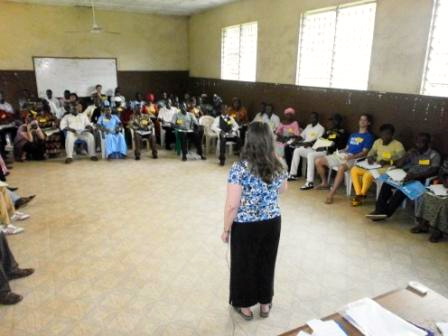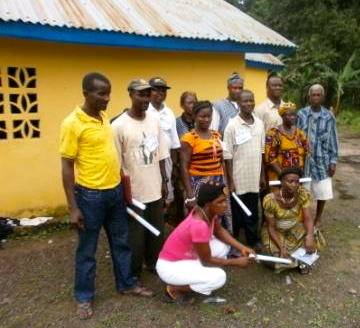Fambul Tok Empowers 60 Secondary School Teachers
Fambul Tok International–Sierra Leone in collaboration with Catalyst for Peace, a US-based foundation, has ended a two- day training workshop for 60 teachers drawn from 30 schools in Fambul Tok operational districts–Kailahun, Kono, Koinadugu, Moyamba, Pujehun and Bombali. The training sessions were held from December 1st and 2nd 2013 at the Catholic Pastoral Centre in Kenema, eastern Sierra Leone.
Welcoming participants and stressing the objective of the workshop, Fambul Tok Programme Officer-Training, Rev. Emmanuel Mansaray underscored the importance of such a vital training for teachers. He urged participants to take it seriously and to share their ideas/skills with children and community members once back at their respective schools.
Executive Director, Fambul Tok International–Sierra Leone, John Caulker said the training was designed to review and evaluate the Fambul Tok Peace Clubs educational school kits, being developed for students in the United States, for Sierra Leonean context.
He added that that the educational Wan Fambul (one family) Branch Toolkit started in the US and will be introduced to Sierra Leonean schools this year. He said the idea behind it is a way of capturing the minds of young pupils who were very young or were not even born before the country’s conflict to learn to make peace, forgive and reconcile with their colleagues, community members and even families.
He read the nine core values of Fambul Tok and stressed that the organization does not compromise when it comes to practicing these principles. The Director did not mince words when he stated that if anyone knew that he/she could not meet the expected standards then he/she is free to leave. He said if anyone compromises the values, Fambul Tok needs to completely dissociate itself from that individual. However participants unanimously agreed to expel anyone from being a peace coordinator for the school program if he/she compromises Fambul Tok values. Mr. Caulker also urged teachers to breach the gap that sometimes exists between teachers and pupils, adding they should always work as one family irrespective of students’ region, ethnicity, or gender. He stressed the importance of field trips and exchange program for pupils as these help expose children to other areas. He stated that communities have within them the answers to their numerous problems and that people most impacted by the civil war in Sierra Leone have the potential to lead the reconciliation process grounded in their own culture and tradition. He emphasized that this is a big lesson the people of Sierra Leone are teaching the world.
Mr. Caulker discussed the need for the educational guides, as they will be helpful in many ways to students, teachers and even researchers. He added that, in the near future, Fambul Tok will engage the Ministry of Education for such materials to be included into the school curriculum.
President, Catalyst for Peace, Libby Hoffman said the Fambul Tok Educational Guides were originally developed as an educational companion for Fambul Tok (the film) for schools in the USA about a year ago. Being aware of the fact that the US audience is different from that of Sierra Leone, Catalyst for Peace and Fambul Tok International–Sierra Leone convened a teachers’ workshop in February 2013 at Njala University campus in Moyamba district in Sierra Leone that brought together twenty teachers from ten schools across the country. The workshop’s purpose was to introduce the Fambul Tok Educational Guide to teachers to see if they thought it would also be useful in a Sierra Leonean context, and if so, to get their input and on how to adapt it to a Sierra Leonean audience. The teachers and Fambul Tok staff went through the Guide page by page, making necessary amendments. The Guide was then revised and a Sierra Leonean version was published last spring. (see http://www.fambultok.com/for-educators for more information, and to download a copy of the US or Sierra Leonean versions of the Guide.)
The current training of teachers in Kenema also included reviewing another educational resource also originally developed for a US audience, the Wan Fambul School Clubs Toolkit, to see if that would also be useful in a Sierra Leonean context if adapted, and if so how it should be adapted. The Toolkit outlines the process for starting and running a student-run Fambul Tok club in schools (called Wan Fambul clubs), and gives students all the resources they would need to be able to successfully manage a club. Where the Educational Guide provides background information on Fambul Tok, Sierra Leone, and the civil war, as well as curricular materials for using the material in the classroom, the Toolkit provides process and management support for engaging students in taking the ideas forward in their schools and communities.
By supporting student clubs in its communities in Sierra Leone, Fambul Tok staff hope this guide helps get the Fambul Tok movement’s message out and engages students and school clubs—to encourage students to be positive agents of change in their various communities.
The teachers reviewed the Toolkit page by page, deciding what worked and what was needed in their unique context, and suggesting revisions. They also did many development and training exercises through group work and presentations, and moved forward in charting new activities for their Clubs in the coming year.
President, Catalyst for Peace, Libby Hoffman added, “Sierra Leonean and American children can build strong relationships with each other through the school clubs by exchanging letters or gifts.” The Catalyst for Peace team came with letters and cards from 4 different schools in the US, all of which have Wan Fambul clubs, responding to students from Fambul Tok schools in Sierra Leone. As a way of encouraging the conversations to continue, Fambul Tok and Catalyst for Peace provided stamps and construction cards to all 30 Sierra Leonean schools to kick-start this idea. Also, the son of Libby Hoffman, Gabe Hoffman-Johnson, generously offered footballs (soccer ball donations received through the Futbols for Fambul Tok program) to the 30 schools.
Meanwhile school clubs, specifically the two pilot schools from each district, had received earlier in the fall TV sets, DVD players, extension cables and Educational Guides. The schools participating in the new program also received the Educational Guides for peace coordinators and Wan Fambul peace club members.





